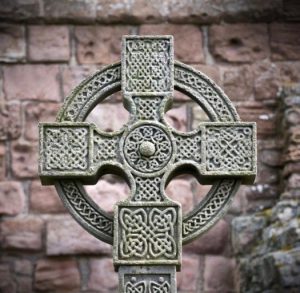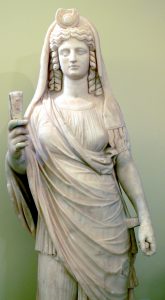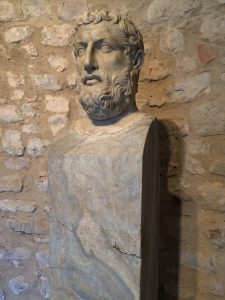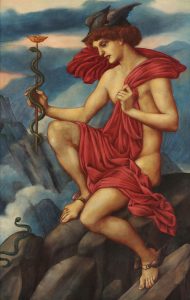by Stephen Crimi
Orpheus in the Underworld, Jan Brueghel the Elder, 1594.
What’s needed for you is to learn all things: both the unshaken heart of persuasive Truth and the opinions of mortals in which there is nothing that can truthfully be trusted at all. But even so, this too you will learn—how beliefs based on appearances to ought be believable as they travel all through all there is.
—Persephone (“Thea”) speaking to Parmenides in the Underworld about duality. (Peter Kingsley, translation, In the Dark Places of Wisdom)
We have been conditioned to view prophesy solely as a prediction of the future, a staring down and unraveling the tangled timelines from a hawk’s ærie. Yet prophesy in ancient days was more like a prediction of the present. The role of a prophet is to be chosen by the Divine to speak for the Divine. This often involves a peek into possible outcomes, but these are normally contingent on not heeding the oracle’s communiqué.
The expression of prophets and the Divine is of course culturally colored. The Greek Gods, especially the Oracles of Apollo at Delphi and Didyma, were cryptic, ambivalent, spoke in hexameter verse, and set a yawning trap for the ego. Most famously, in the 6th century BC, the king of Lydia, Croesus, thought he had the goods to take on the Persian Empire. He sent representatives to Delphi to ask if it was a smart move. The reply: “If Croesus goes to war he will destroy a great empire.” The emboldened Croesus took on the Persian Cyrus, fought to a draw, but instead of disbanding, Cyrus pursued, riding on camels instead of horses, the odor of which freaked out the Lydian cavalry, and a massacre ensued. Be careful which empire you destroy, it may be your own.
The Abrahamic prophets are normally resonant with the God they speak for. Take this metaphorically if you like, but the Old Testament tale of Elisha and the 42 children is chilling (2 Kings 2:23-5). A bunch of boys made fun of the apparently dome-topped prophet in the marketplace. “Hey baldy!” they jeered. The tonsorially-sensitive Elisha cursed them and Yahweh sent two bears out of the woods to fatally maul all 42 children. In the 2nd century, the gnostic Marcion, wrote a work called Antithesis, comparing this passage to Mark 10:13-14, (when the apostles tried to edit out the children who wanted to be with Christ), “Allow the little children to come to me, and forbid them not, for of such is the kingdom of God”. (I had a civil discussion regarding this tale about Elisha with fundamentalist Christians once, who had an absolute literal reading of the Bible, except when it came to this passage…) Marcion called the OT deity a demiurge, one who only thinks he is the ultimate creator, compared to the “Good God” of the Christos. Jewish comedian Lewis Black irresistibly juxtaposes them even better:
“There is a big difference between the Old Testament and the New Testament, and that is: The New Testament God is really kind of a great guy—he is—especially when you compare him to the Old Testament God, who is a prick. I don’t know what happened to God, you know, over time—if he matured, if he went to an anger management class—or maybe just the birth of his son calmed him down. But before he had the kid, holy fuck he was out of control! All you do is read the Old Testament—look at Abraham, the first man to have faith in one God—what does God do? Hey Abraham, come here! Come here, bring your kid. Let’s barbecue him! Ah ha ha ha!”
There is a deep Geminid rabbit hole there for those who dare to out-stare the abyss.
So we will do with an exegesis of Leonard Cohen’s “The Future”. Bruce Springsteen, whose music I appreciate but never actually listen to, made a great observation. He did not use these words, but the idea is that in a song, especially a great song, the verses are the immanent, and the chorus is the transcendent. This is maybe the most fundamental Gemini duality there is. In any mystic or philosophical view, the immanent is the indwelling world we inhabit, the apparently physical sensorium, where most of life is experienced. The immanent includes the experience of time and space, the senses and elements, and thus is represented as a horizontal line. The transcendent is just that: the realms “outside” our pedestrian awareness that penetrate from above or below, the spiritual arena we connect to, the supernatural, the dream world, the imaginal world, the house of living myth, the angelic connection, woo woo from the mystical to the malevolent. This is represented with a vertical line.
From here we can glimpse the true meaning of the cross, we are that intersection, our heart this crossroad where the immanent and the transcendent collide, converse and hopefully cooperate. More or less, this is what it means to be a human, and the more we can integrate this experience, the more fully human we become.
Leonard Cohen’s song “The Future” appeared on an album of the same name released in 1992, at the onset of this technocratic or third industrial revolution, and its transhumanist telos, or full-spectrum control endgame, in full genetically altered flower now. The internet Kraken was just released, and former analog life would soon transmute into niche nostalgia. The Berlin wall crumbled with the USSR, and neo-carpetbaggering vultures circled the “not quite dead yet” eastern European corpus, shading it with outspread wings of the new buzz-ard word, “privatization”. At the end of the decade this same flock would rebrand as the neocon globalists, but that is too much story for today.
Cohen’s lyrics traverse the sacred and profane duality like no other songwriter’s, in an almost dizzying way. The speaker of the first two verses, who sounds like an out of work Stasi agent, expresses anger at the loss of his totalitarian cosmos.
Give me back my broken night, my mirrored room, my secret life, it’s lonely here, there’s no one left to torture. Give me absolute control over every living soul, and lie beside me baby, that’s an order!
The night is broken by the cries of the innocent in double mirrored rooms, tormented under the dead eyes of Kafka-esque souless bureaucrats, but don’t worry, in the future torture will be writ large. The mirrored room will be exchanged for the monocular computer camera, then siri and alexa, and soon the internet of things. As has been noted well by Amazing Polly and a host of other (mostly in the process of being erased) indie researchers, all aspects of this continued lockdown are literal textbook psychological torture. Having a “secret life” is of course a sick joke. And as the Motels sang more than a decade before Cohen, “I would sell my soul for total control over you,” which is the crux of the biscuit, the hole of the doughnut. Forget love, even sex exists only under a command. (See Epstein, nxium, etc etc ad infinitum, ad nauseum.)
The next stanza is possibly bleaker.
Give me crack and anal sex, take the only tree that’s left and stuff it up the hole in your culture. Give me back the Berlin wall, give me Stalin and Saint Paul. I’ve seen the future brother: It is murder.
Crack and its kissin’ cousin, meth, are never far from the news, and never far from sexual depravity, from Hunter Biden, to near governor of Florida Andrew Gillum, to the evangelical Ted Haggard, to Clinton fundraiser Ed Buck—who injected two gay men with lethal doses of meth. Aaron Sorkin merely attempted to board a plane with a carry on load of crack, mushrooms and pot (best guess is that his charges were dropped in exchange for writing the complete bs bio screenplay of the “official” life of Zuckerberg, who had zero to do with the creation of FB, another fine mess).
Most darkly and sadly, there are a litany of MKUltra survivors who testify to childhood anal rape as mandatory to the creation of “alters” within them, and further as a part of releasing adrenochrome, the real addiction of the political and hollywood elites. This is followed by another brutal image, the terminal tree raping the “hole in your culture”. This is very strange, as if the narrator has no idea that it is his culture doing the raping.
He wants the Berlin wall back, that secure line behind which he can engage in depravity; and then the religious comes in, co-listing Stalin and St. Paul. Something a little more going on here than a dialectic “Stalin bad, St. Paul good.” In fact, this is being prophetically played out in our current miasma, as both are godfathers of the two sides ripping us apart right now.
Usually the number 20 million is given to the total of those dead under Stalin. One could understand that people in the communist movement would only get propaganda during the decades of Stalin’s rule, but now everybody knows what happened: the gulags, the generated famine, the brutality, the disappearances. One would think it would be a no-brainer to reject Marxism or social Marxism as inherently bad for your health. Yet here we are, not out of living memory of those events, with BLM led by avowed Marxists, and antifa barking quotes from the Communist Manifesto through bull horns—as if there is some sort of correlation between volume and reality—and calling for the reeducation camps so helpful under Stalin and Mao. So no-brainer seems to be the operative word. I’ve seen the future brother (comrade): it is murder. Murder the past, the present and the future.
One would think that murder would be antithetical to the teachings of St. Paul. Maybe superficially, but he is more responsible than anyone (including arguably Jesus) for the establishment of what becomes the Roman Church, thus the murders of indigenous, pagan, herbalist and basically any non-papal communities under the inverted sign of the cross. They are uncountable, and still continue.
Then the chorus:
Things are going to slide, slide in all directions, won’t be nothing, nothing you can measure any more. The blizzard, the blizzard of the world has crossed the threshold and it’s overturned the order of the soul.
When they said “repent, repent”, I wonder what they meant.
Sliding in all directions is the chaos we currently inhabit. Beyond the controlled demolition of the Gemini towers, the fabricated riots—and murders in response to riots—undermine the frayed fabric structuring culture. People are unsettled, looking to move, even under the aegis of nowhere to go with certainty.
“Nothing you can measure any more” is a riff on the ancient Greek Protagoras of Abdera’s (5th century BC) famous assertion that “Man is the measure of all things.” The Greek version of Gemini, Hermes, is also in charge of measuring and order. A herm is a stone placed at borders to delimit enclosures. Protagoras’ point may have been that since the connection with the Divine is severed, only human experience is justified in ordering the cosmos. This relates to much later Marxist ideology, where only historical forces of class conflict form us. There is nothing beyond that involved, the order of the soul is overturned and irrelevant. If you are a Marxist, you have no soul (except maybe some abstract force of the collective); you thus are immanent without the transcendent, profane sans sacred. Thus the 11th century Assassin’s Creed: “Nothing is true, everything is permitted”.
The State becomes God in Marxist countries. Not very funny how socialist prisons are filled with those who would not “repent” of their sins against the state. The “I” of “I wonder what they meant” feels like a shift to something close to the Cohen persona speaking. Repentance and salvation were not part of incipient Christianity, but for some sects gnosis and transmigration were. Cohen is less aligned with Biblical prophets begging repentance for sins—especially the Augustine-invented “original sin”—and more resonant with the Greeks. Their word for sin, hamartia, meant “missing the target” in Homer’s epics, and morphed through Aristotle into something like the “fatal flaw” of tragedy, often hubris.
What better descriptive than “blizzard” for the onslaught of frigid information Cohen envisions? It has now crossed the threshold that we used to use to realize that we are not the packaged social/political opinions foisted upon us. The “order of the soul” holds together our inner sanctity, our realization of the world experienced as coming from within. In the era of identity politics, people don’t have opinions, the opinions have them.
Again a shift of narrator for the third verse, possibly as an antipode to the speaker in the first two: ambiguous, Biblical, but now full of prophetic certitude.
You don’t know me from the wind, you never will, you never did. I’m the little Jew who wrote the bible. I’ve seen the nations rise and fall, I’ve heard their stories, heard them all, but love’s the only engine of survival. Your servant here, he has been told, to say it clear and say it cold: It’s over, it ain’t going any further. And now the wheels of heaven stop, and you feel the devil’s riding crop. Get ready for the future, it is murder.
In Genesis 1 a wind that is mostly translated as “The Spirit of God” moves over the waters and lets there be light. This prophetic voice, speaking for the divine—as mentioned earlier in the Greek sense of bearing the deity’s voice—claims unknowability, while already knowing all stories (in fact, writing them, wryly claiming to be the little Jew behind the Bible) and the cycles of history. This “wheel of heaven” has made it’s final turn, we have given up on love as the engine of culture (as the Christos and Sufis focus upon) and must endure the depravity and murder of being ridden by the devil. Or as Tom Waits sings, “You know there ain’t no devil: There’s just God when he’s drunk”.
Then the predictions get more specific and accurate.
There’ll be the breaking of the ancient western code; your private life will explode; there’ll be phantoms, there’ll be fires on the road; and the white man dancing. You’ll see the woman hanging upside down, her features covered by her fallen gown; and all the lousy poets coming ‘round, trying to sound like Charlie Manson.
What the ancient western code is, is not exactly clear. Ten Commandments? Hammurabi’s Code? Shakespeare’s code? Or maybe something from Parmenides at the dawn of the West that we will look at as we conclude. A good guess connects it with the previous order of the soul, and the story of love. But the most prescient line is “your private life will explode”, painfully so now, as no iota of living is private, and a full generation seems fine with publicizing every aspect of their experience. It fulfills a line from Cohen’s previous prophetic and related song, “Everybody Knows”: There’s gonna be a meter on your bed that will disclose, what everybody knows.
Black-masked phantasmagoria weeping and chanting, fires simmering in the street of our cities for months now throughout this lockdown. It is all happening. Maybe the white man is prophet Cohen shuffle-dancing through it all.
Hanged Woman, Dreamkeeper Tarot (Liz Huston); Hanged Man, Viscount Sforza (1450 Milan);
The hanged woman is a clear reference and sexual inversion of the tarot card of inversion, another Geminid coupling. Her face in this song of the future is masked by her fallen dress. We need say no more on this coming true. If the hanged man card is about sacrifice, a stop on the path, suspension of action, who might be the hanged woman?
A woman wearing a gown is emblematic of romantic love, the antithesis and preventive foil of the “it is murder” incanted throughout the song. And if Love is on pause, suspended and about to be the final sacrifice of this dark Geminid ritual that this is the fifth and final blog installment of, then Strife rides roughshod until the next cycle is initiated. And are we not suspended now at the onset of the aforementioned WEF/WHO/UN 2030/etc technocratic mind virus apocalypse (“unveiling”)? Some of us reject the simulacrum; some embrace it; and the vast majority, in spite of all the signs and portents, haven’t a fucking clue as to the merde they perpetually step in and track into their homebodies.
Maybe the worst murder of the future is the end of literature. Poetry, stultified in academia, around the time of this song downgraded into competitive “slams”; more or less vituperous rants akin to biblical prophetic bombast. Of course, Charles Manson, who certainly considered himself a prophet for some hellish thing, is one of the deepest all-time wormholes in looking for “what really happened”, but his cult of death serves as a dark muse for another cult of death, one hiding under the Dracula cape of anti-fascism. What kind of poetry or music can emerge from that sump?
Give me back the Berlin wall, give me Stalin and Saint Paul, Give me Christ or Hiroshima. Destroy another fetus now, we don’t like children anyhow; I’ve seen the future baby: It is murder.
Cohen must have made a good number of enemies in the liberal realms by relegating abortion to a part of this end times murder spree. And if you don’t like children, you have no investment in the future. Even worse are the recent admissions of the previously sacrosanct Planned Parenthood selling fetus parts and mailing them fed ex.
Christ or Hiroshima? Are those the options we are left with? On one hand it is the ultimate juxtaposition, the avatar of love opposed to a gift of megadeath that keeps on taking.
The “transcendent” chorus repeats—the verses are in minor chords and the chorus in major chords—the cosmic chaotic slide has come, order is flipped into “mere anarchy”, and there is a staring-into-the-abyss hidden joke as the song fades. Even though Cohen sings “I wonder what they meant”, the Greek chorus back up singers chant “repent” twenty times following, echoing him. That is a total of biblically-correct forty times. Cohen knows exactly what it means. Forty is the number of completion, it’s over. The subtext really is: repent or this is your future. We have pretty clearly demonstrated that the future of “The Future” is our present.
Persephone, Goddess of the underworld, holding a sistrum, a shaker used to help induce shamanic journeying; and Parmenides, whose incantatory poem of his meeting with this Goddess sets the template for Western Civilization.
Around 2500 years ago a Greek philosopher from Velia named Parmenides, experienced a katabasis, an underworld journey. Carried by longing, carried on an otherworldly chariot, whose axles sing the flute sound of the syrinx; led by Daughters of the Sun through the Gates of Night and Day, which reach from the heavens to the bottom of all; to the waiting right hand of Persephone, who speaks the words of the quote that this piece began with. (Peter Kingsley’s Reality is essential reading for anyone who wants to uncover this actual inception of our civilization.)
This is not an allegory, or poetic fancy. Parmenides in some way did this, and became the first prophet of Western culture. Orpheus is the last prophet of the previous age, the Age of Heroes. Pythagoras, whose Pythagoreans taught Parmenides, also performed a katabasis, but his work was more to gather and synthesize the wisdom of the known world, laying the substrate for something new to emerge. Parmenides is a prophet in the classic sense of bringing back the wisdom of the Divine. Her words to him are unambiguous: I will do the talking: and it’s up to you to carry away my words once you have heard them.
We cannot go into detail, but it is worth repeating the opening quote:
What’s needed for you is to learn all things: both the unshaken heart of persuasive Truth and the opinions of mortals in which there is nothing that can truthfully be trusted at all. But even so, this too you will learn—how beliefs based on appearances ought be believable as they travel all through all there is.
Here is the source of our Geminid reality: Parmenides brings back both Truth—aletheia (to not drink the draught of Lethe, forgetfulness)—and mortal opinion. The Truth is in Her teachings about being, the mystic reality of what is.
It never was and never will be because it is now, all together, one, holding to itself. For what possible birth of it will you look for? In what way could it have grown? … And also: there is no dividing it because it’s all alike. There is nothing more here that could stop it from holding together with itself or less there. But all of it is full of being. So it is that everything is continuous with everything because being draws near to being.
The Sufis, who actually studied this and the concordant teachings of Parmenides contemporary, Empedocles, wrote tomes on the Unity of Being, and it forms the basis of Rumi’s poetry. This experience of unity is the birthright order of the soul that is now inverted, overturned, with the way roadblocked.
But the Goddess, Thea, is not finished. She teaches Parmenides about the “deceptive” world of opinions, “so that nobody among mortals will ever manage, in practical judgement, to ride on past you.” That is, Persephone teaches him the cutting edge of knowledge of the illusory physical world, so he can have the navigational cunning (Metis, who is also a Goddess) to steer these shifting seas.
Specifically she teaches him that the world is a sphere, first known mention of this; about the tropics of Cancer and Capricorn; the movements of the sky, empyrean, sun; the nature of the moon; the reality of the Milky Way and of Mount Olympus. She taught about the nature of thought, and how the “divinity who steers everything rules over love-unions”, and how the cosmic movements relate to the genetics of bringing children into this realm.
Persephone, in describing this Geminid reality, seems to be in agreement with what was stated earlier about immanence (realm of opinion) and transcendence (oneness of being). She goes further though. Outside of the mystic experience, we still think the world exists independently outside of us. That there is a solid world “out there” independent of us. What is real is only being, our experience, our sensorium. The grocery store up the road is only a thought. Donald Trump and Joe Biden are only thought-forms we have generated. We have reified them through repetitious thought, chanted them into apparent existence. We have to navigate both the illusion and the reality of oneness that pervades and falsifies it.
We are not born into a world, the world is born through us.
This is why Persephone teaches Parmenides the deepest knowledge of the structure of the illusion. If you do not base your culture upon the wisdom of understanding both the illusion and the unitive being permeating it, then it is open to manipulation and ripe for the disintegration into the future envisioned by Cohen we all now experience.
Parmenides, like Pythagoras, was a healer. One can only heal when the cause is apparent. This is true for both an individual or a culture. His teacher Ameineas taught him hesychia, “stillness”, the practice used in incubation to precipitate a katabasis, a journey to the underworld deities. In some way we all need to take this path to the heart of ourselves, where all of this lives and dies. If the Abrahamic prophets are right, then this is a linear trip to some endgame of final judgement. If the Greeks prove correct, then we cycle out of this morass to our re-inauguration, an age where we play once again with the Divine in the Garden.
Mercury, Evelyn De Morgan, circa 1880







A truly wonderful work, Flavio, if that is what I should call you, and it deserves comment. However, being a mere mortal, I have no idea what to say.
Well, Flavio, I was not sure how to respond to such a wonderful piece. I’m sorry but I’m really not one for using or dealing with a “language of the divine.” That usage escapes me nowadays, I’m not sure why but it does me little good at expressing my understanding or communicating with other mortals like myself. I thought what you say was beautifully written and its message is clear, but I am stymied, lockjaw, nothing, nada. I waited for something to come, nothing came. What do you do with the perfect piece of pie? Eat it, not comment on it. So, I ate it. It is a language that appeals to a certain type of literati, and I am just a street kid from Brooklyn. I am not up to that level of discourse nor would I dare to add or subtract from it. I might break it if I touched it. It was just too wonderful. It would be like someone asking me to finish a painting by Cezanne. How in the hell would I know what to do with it? I do love it!